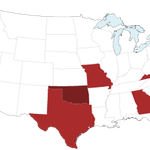
An unusually high number of executions are scheduled for late September and early October - five states intend to carry out six executions in nine days. Pieces in the Los Angeles Times and the Washington Post describe the larger issues raised by the cases in this “burst of lethal activity.” In the Los Angeles Times, Scott Martelle examined the three executions scheduled for consecutive days in Georgia, Oklahoma, and Virginia, concluding, “So here we have three pending executions: One of a woman who received a harsher penalty than the co-conspirator who committed the murder; one of a man who very possibly is innocent; and one of a man whose intellectual disability should make him ineligible for the death penalty.” Mark Berman, of the Washington Post, noted the overall rarity of executions and the small number of states that carry them out. He says “most states have … not been active participants in the country’s capital punishment system” and “executions remain clustered in a small number of states, a dwindling number of locations accounting for an overwhelming majority of lethal injections.” Berman notes that the number of executions, the states executing inmates and the number of death sentences have all fallen significantly since the 1990s and the upcoming executions share one common characteristic: “The states planning the executions this week and next — Georgia, Oklahoma, Virginia, Texas and Missouri — are among the country’s most active death-penalty states since the death penalty was reinstated by the U.S. Supreme Court in 1976.”
(S. Martelle, “Three days, three planned executions, three wrong calls,” Los Angeles Times, September 29, 2015; M. Berman, “The U.S. has six executions scheduled over the next nine days,” The Washington Post, September 29, 2015.) See Arbitrariness, Innocence, and Intellectual Disability.
Innocence
Oct 23, 2024

The Limitations of DNA Evidence in Innocence Cases
Innocence
Oct 15, 2024

